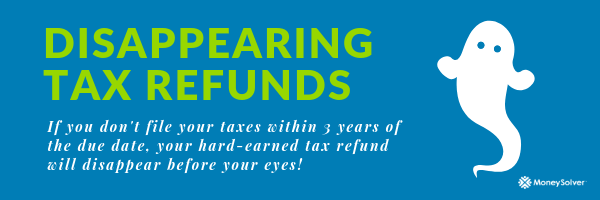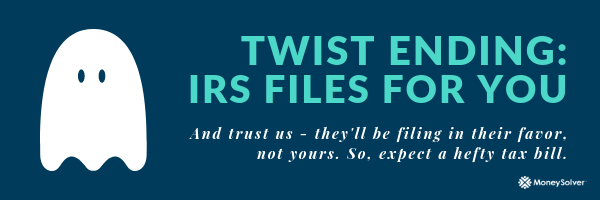4 Ways that Unfiled Tax Returns Can Haunt You
Haven’t filed taxes in a year or two (or four or ten)? You’re not alone. While the majority of people pay their taxes on time, about 7 million taxpayers fail to file their taxes every year. If you’re in that 5% of taxpayers, you might be asking yourself, “What’s the worst that can happen if I haven’t filed my taxes for this past year or previous years?” Well, the consequences for unfiled tax returns aren’t pretty.
We’re not saying that the IRS operates like a scary movie villain, but they do know how to haunt people who don’t follow their rules and file on time. Their tactics range from disappearing tax refunds and credits to a not-so-pleasant surprise filed tax return on your behalf. The kind of haunting that the IRS will do isn’t so easily solved with burning sage or sprinkling some salt. Instead, this IRS haunting might be best solved by tax preparation help.
1. You Could Face Suspenseful Silence from the IRS About Your Unfiled Tax Returns.
Believe it or not, if you don’t file your taxes, it’s possible the IRS may not reach out to you immediately.
You’ve probably heard horror stories about notices piling up in your mailbox and IRS tax collectors knocking down your door. But you rarely hear about the even spookier outcome: that you don’t file, and the IRS seemingly doesn’t do anything in response.
In case the IRS hasn’t contacted you, don’t be quick to assume that this suspenseful silence means they haven’t noticed. It’s possible, especially if you’re self-employed and don’t have any W-2s or Form 1099s that get sent to the IRS.
However, it’s equally possible that the IRS doesn’t have your correct address. They could be mailing you notices left and right. But if they don’t have an updated address for you, you won’t get those notices. And unfortunately, that’s on you. It’s your responsibility to update the IRS on your current address.
2. Tax Refunds and Credits Can Disappear Before Your Eyes.
Say you didn’t file your tax return four years ago. If you had any tax refund due to you from that return, it’s long gone by now. See, if you’re due a refund for withholding or estimated taxes, there’s a statute of limitations that kicks in. If you don’t file your return within 3 years of the due date, you’ll lose that money that was rightfully yours.

The same goes for tax credits like the Earned Income Credit. In fact, the IRS can be even more stingy with tax credits. If tax credits can cause a refund on a previously unfiled tax return, the IRS is unlikely to give them to you in retrospect.
Why let the IRS keep money that is rightfully yours? By leaving your tax returns unfiled, you’re giving them the go-ahead to hold onto your hard-earned money.
3. You Can Struggle to Make Big, Life-Changing Purchases.
Think about those monumental purchases you may make in your life:
- A brand-new car
- A mortgage on the perfect house for your family
- A loan to start your own business
- Tuition to attend the college of your or your child’s dreams
One of the unexpected ways an unfiled tax return can haunt you is your sudden inability to make these big buys.
When you make purchases this big, you’re typically borrowing money. When you borrow money, financial institutions tend to require income verification to ensure you’ll be able to repay them. If you aren’t a W-2 employee, how will banks verify your income? You guessed it: using your tax returns.
Not having tax returns could indicate to lenders that they cannot trust you’ll be able to repay the loan. This isn’t to say you’ll be unable to buy a home or a car; just keep in mind that these processes will be much more difficult without tax returns.
Also, you’ll need your federal income tax returns to complete the Free Application for Federal Student Aid (FAFSA). Without this info to prove your financial need, you’ll be unable to apply for federal financial aid. Whether it’s for you or your child, this means you’ll miss out on helpful federal grants and subsidized student loans. And for similar reasons to those posed above with loans for cars and houses, you may find it difficult to take out private student loans as well.
4. The IRS Can Surprise You with a Twist Ending by Filing for You.
If you don’t submit a complete tax return, the IRS may do themselves a favor by filing a substitute.
Notice that we don’t say they do you a favor by filing your unfiled return. That’s because the substitute return they file on your behalf will not give you any of the credits, deductions, or exemptions you may have qualified for.
When the IRS files for you, it’s because they believe you owe them a tax debt. With a tax bill in play, the IRS has more to gain by filing for you.

What This Twist Ending Looks Like
You’ll receive a Notice of Deficiency CP3219N, which will walk you through their substitute return. You’ll have 90 days to file the return in question or file a petition in Tax Court. If you don’t do anything in those 90 days, the IRS will go ahead with their return.
Once the IRS has hit you with that twist-ending bill (plus any failure-to-file and failure-to-pay penalties they see fit to charge), you’ll then have to figure out how to pay your balances owed. Otherwise, you risk facing further IRS collection actions like levies and liens. Of course, you always have tax relief help options you can explore like an installment agreement or an IRS debt forgiveness program.
However, it’s still best for you to focus on filing your own tax return to try and take advantage of those deductions and exemptions the IRS may have glossed over in their substitute return. Once they have your filed return, the IRS usually will adjust your account accordingly.
Instead of ignoring unfiled taxes, take control of your life. When unfiled tax returns are haunting you, seek tax preparation experts to help to clear the air. With years of experience under their belt, tax professionals like ours can make sure your unfiled tax returns are filed correctly while maximizing deductions to minimize any potential tax bills.
*Read the original post on our Tax Defense Network blog
